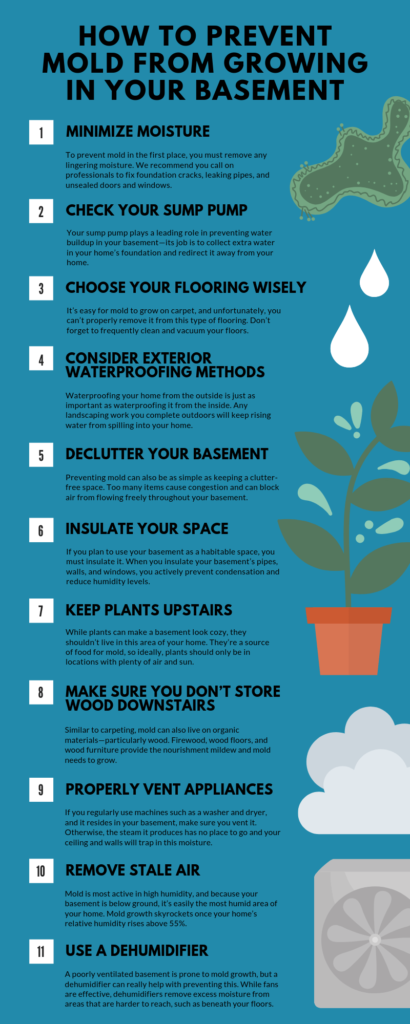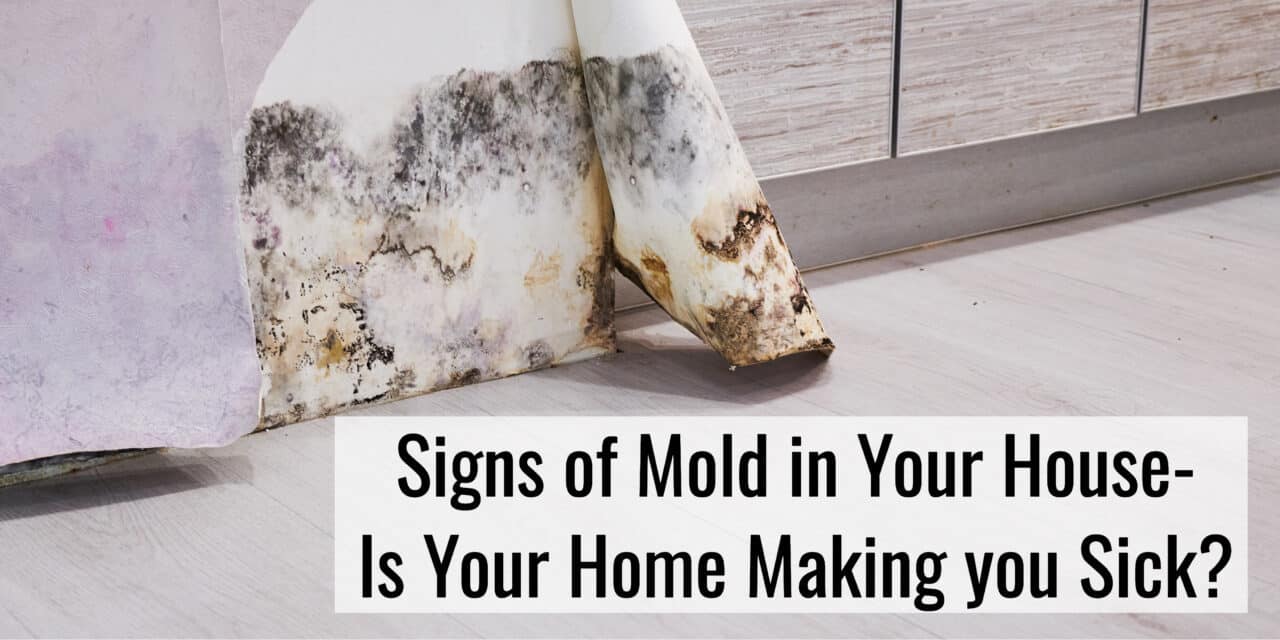This post is a special guest post by Lauren Egger, founder of the Healthy Mom Project. Lauren, diagnosed with celiac as a freshman in college after years of being misdiagnosed, created her blog to help inspire and educate mothers on how to make healthy choices for their families. You can follow Lauren on her blog at healthymomproject.com/.
What if I told you mold could be the root cause of your underlying health issues? This environmental issue is not typically something we are informed of from our doctor’s office, but it is vital to be aware of. There are several key items to look for when trying to identify signs of mold in your house.
Molds are a naturally occurring fungus that is found almost everywhere. Outdoors, mold plays a large part in nature. Mold thrives on moisture. Lightweight, invisible spores can travel through the air when mold is present.
In a minimal amount, it’s usually not harmful. But in larger amounts in select individuals, it is hazardous. Some people are more susceptible to mold than others. People with respiratory issues & compromised immune systems are at an increased risk of experiencing health problems. Even if you or your kids don’t have asthma, respiratory issues, or a compromised immune system, too much mold exposure negatively impacts your health & you should take measures to prevent mold from growing in your home.
So, how do you know if you mold is something you should be concerned about? What are the signs of mold in your house that you should be aware of? Keep reading as we answer these questions as well as dig into my own personal story on how I learned about the toxic potential of mold exposure.
Some Say Mold Toxicity Doesn’t Exist
Much of the available but extremely limited research state that symptoms/conditions from mold exposure such as fatigue, headache, gastrointestinal conditions, and autoimmune conditions have yet to be proven.[1] Further research also states, “the point at which mold contamination becomes a threat to health is unknown.”[2]
Really, conclusions on the effects of mold on human health cannot currently be made due to too little and too weak of research. Anyone who states that mold cannot cause harm to humans because there is no research to prove it, should be reminded that it was as recent as the mid-1990’s that physicians were stating, “Celiac disease doesn’t exist in the United States. There is no research to support it.” We now know Celiac disease is one of the most common autoimmune conditions in the United States affecting approximately 1 in 100 individuals.
Many individuals can testify that many of their chronic and unexplained symptoms did not improve until they and their home environment were treated for mold toxicity. Many individuals will also tell you that they battled health issues for years and saw a countless number of medical specialists, spent thousands on testing and supplements without relief until they saw a functional or integrative health specialist that encouraged them to find and remove mold from their home as well as treat the mold (mycotoxins) that colonized in their body.
Signs of Mold in Your House
The presence of toxic indoor molds is detrimental to our health. They are linked to a vast amount of health problems including autoimmune diseases & malignancies.
There are many, many symptoms of mold! The vague nature of many of mold toxicity symptoms explains why it’s hard to pinpoint that mold could be a part of your health issues. Some of the symptoms of mold toxicity include:
•Fatigue
•Autoimmune disease
•Chronic coughing
•Headache
•Light Sensitivity
•Elevated blood pressure
•Red Eyes and/or Blurred Vision
•Sinus Problems
•Focus/Concentration Issues
•Recollection Issues
•Memory loss
•Decreased Learning of New Knowledge
•Confusion
•Abdominal Pain or new onset of digestion issues without cause
•Aches, Pains
•Vertigo
•Tremors
•Cough
•Shortness of Breath
Can I be Tested for Mold?
The short answer is yes.
The long answer is that its not that easy.
There is a blood test you may ask your primary care physician for. However, the test is only geared toward determining a mold allergy and will not be helpful in determining if mold toxicity may be affecting your health.
This is similar to how testing for an allergy or reaction to gluten cannot properly identify everyone sensitive to gluten as many improve despite all testing being negative. For example, those with celiac disease present with a test-confirmed immune response to gluten while those with non-celiac gluten sensitivity will have all negative tests for a response to gluten despite their symptoms improving with the removal of gluten. Non-celiac gluten sensitivity is a medical diagnosis that is recognized in the medical community.
So, while testing such as a skin prick test or radioallergosorbent blood test for mold may be able to measure the body’s immune response to mold to identify an allergy, it will not be able to identify those who will respond with a resolution of symptoms despite negative testing.[3]
The Gold Standard for Mold Mycotoxin Testing in the Body
The gold standard for mold toxicity testing is a urine test performed by RealTime Laboratories and Mosaic Diagnostics.
Since many traditional physicians do not believe mold can cause any harm to health, they’re unlikely to order these tests, however. It will thus be best to consult with a functional medicine doctor, naturopath, of functional nutrition dietitian to order these tests. Those trained in functional medicine and nutrition can order and interpret mold testing, and help provide detailed guidance on how to treat mold toxicity if testing confirms it is in fact an issue. You could also consider searching for a physician who specializes in treating mold through Surviving Mold website.
If you are concerned that you have been exposed to excessive mold at some point in your life or suffering from mold toxicity symptoms, consider a high-quality and proven mold mycotoxin test for yourself as well as environment testing for your home. However, even if the tests come back negative, remember that you may not know the true benefit of removing mold from your body or environment until it is completed.
Important note: Did you know mold toxins can stay in your body for years?
Mold can colonize into different parts of your body, and roughly 25% of us are unable to detox from it. So, living in a moldy environment many, many years ago may still be a problem for you today!
How to Tell if You Have Mold in Your House
Mold can grow anywhere where there is moisture. Some common places are your walls, floors, appliances, carpet, furniture, air conditioner, &/or your humidifier.
Things to consider:

- Look out for hidden leaks. Look at your ceilings & walls to see if you see any wet spots. The pipes are behind drywall so you can usually see if there are any small leaks because it shows through the walls and ceilings.
- Keep your air conditioner clean. Air ducts and different parts of your home ventilation are often a hidden spot where mold could be growing. Change your filter every three months. It’s easy for moisture to build up here, and cause mold to grow. Let your device run on low or “automatic” to keep the humidity low.
- Open your windows. Bathrooms, laundry rooms, and kitchens create a lot of heat & moisture. It’s essential to keep your house well ventilated to prevent moisture build-up, which could cause mold to grow.
- If you have a humidifier, check it VERY often. This is a culprit for mold. If you have one in your children’s rooms, it should be cleaned and checked before every use.
- If you spill water anywhere in your house, clean it up thoroughly right away! If your basement floods, have a local company come in and help you clean it correctly so mold does not grow.
How to Get Rid of Mold in Your House
Identifying the source of where the mold is coming from is the first step. While you may consider using a homemade, non-toxic cleaner to remove the mold, I would unquestionably advise you to hire a company who are experts at mold, and mold remediation.
Consider doing a search for “mold cleaning services” in google to find a reputable company with experience in removing mold. While you may want to save a few bucks, the expertise of a professional company in being able to help solve the root cause of the mold growth, prevent it from coming back, as well as reduce your exposure to the mold during the cleaning process will likely be completely worth it.
My Own Story
I started having major GI issues when I was 15, right after I went to Aruba & came down with ‘travelers’ diarrhea’. I was finally diagnosed with celiac disease when I was 18. What is interesting is understanding we all have certain genetic predispositions, and sometimes the perfect storm happens that creates our health issues.
I was on tons of antibiotics as a child, stress from competitive gymnastics, birth control as a young teenager, travelers’ diarrhea (which was probably a parasite I couldn’t get rid of), and then possibly mold exposure as a teenager. I recently had the home I lived in from 13-17 years old tested for mold, as my parents still live there. My mom has had the ‘c-word’ for over 10 years now, and we have recently started her on some aggressive natural therapies.
So, I had their house tested as I was convinced there could be mold.
And what was the result?
You guessed it, there it was, mass amounts of mold in multiple areas. One area was underneath the kitchen sink, and the other one in the basement behind the baseboards and under the carpet. We had a local company test the air, identify where it was coming from, cut it out, remediate the mold, & test for mold after the service was completed.
What was the end result? Time will tell. I know I feel better after having moved out of a house with mold and I hope to help the health issues of my mother and prevent future issues for my parents buy helping clean out the excessive amount that was still present in their home.
Keeping Mold in Perspective
While its hard to pinpoint the root source of health issues, we should remember that our immune system is often being overloaded from so many different angles. From toxins such as pesticides in our food, to eating foods that cause inflammation, to chemicals in our environment in paint or carpets, there are many, many things in our environment that can be contributing to us feeling sluggish. And, if you have excessive mold in your home, it may be one major contributing factor to your health issue by pushing your immune system into overdrive and heading down the road to an autoimmune disease.
Now that you know how to identify the signs of mold in your house, not only is it time to identify where it is and have it cleaned up, but its time to figure out the root causee of why it started. Be sure to identify possible weatherproofing, moisture, or leak issues which may be contributing before you have mold treated so that you don’t end up right back to where you started.
Are you concerned you have been exposed to mold or have your own story? We’d love to hear so we can help others!
References:
- https://www.ncbi.nlm.nih.gov/pubmed/19255924
- https://www.ncbi.nlm.nih.gov/pubmed/11036728
- https://www.mayoclinic.org/diseases-conditions/mold-allergy/diagnosis-treatment/drc-20351525
- https://www.ncbi.nlm.nih.gov/pubmed/28299723
- https://www.glutenfreesociety.org/does-mold-cause-autoimmune-disease/
- https://www.ncbi.nlm.nih.gov/pmc/articles/PMC5377931/








